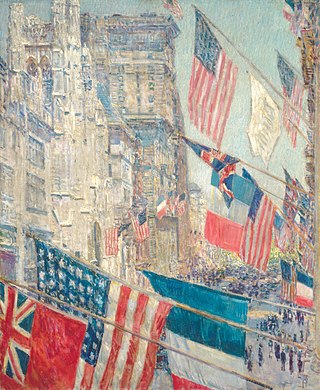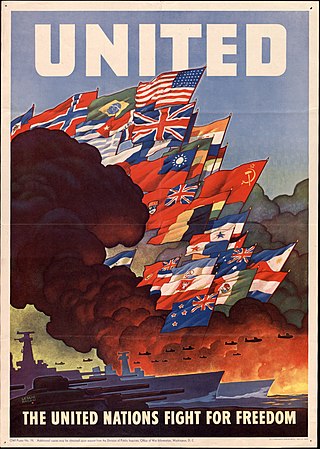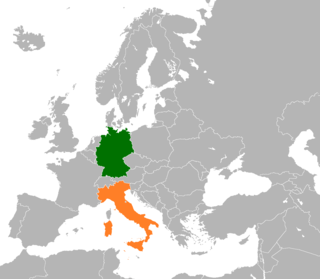Allied powers are nations that have joined in an alliance. More specifically, the term may refer to:

The Central Powers, also known as the Central Empires, were one of the two main coalitions that fought in World War I (1914–1918). It consisted of Germany, Austria-Hungary, the Ottoman Empire, and Bulgaria; this was also known as the Quadruple Alliance.

The Axis powers, originally called the Rome–Berlin Axis and also Rome–Berlin–Tokyo Axis, was a military coalition that initiated World War II and fought against the Allies. Its principal members were Nazi Germany, the Kingdom of Italy and the Empire of Japan. The Axis were united in their far-right positions and general opposition to the Allies, but otherwise lacked comparable coordination and ideological cohesion.

An alliance is a relationship among people, groups, or states that have joined together for mutual benefit or to achieve some common purpose, whether or not an explicit agreement has been worked out among them. Members of an alliance are called allies. Alliances form in many settings, including political alliances, military alliances, and business alliances. When the term is used in the context of war or armed struggle, such associations may also be called allied powers, especially when discussing World War I or World War II.
Sino-Japanese War most often refers to:
Allied forces or Allied force may refer to:
The Kingdom of Romania, under the rule of King Carol II, was initially a neutral country in World War II. However, Fascist political forces, especially the Iron Guard, rose in popularity and power, urging an alliance with Nazi Germany and its allies. As the military fortunes of Romania's two main guarantors of territorial integrity—France and Britain—crumbled in the Fall of France, the government of Romania turned to Germany in hopes of a similar guarantee, unaware that Germany, in the supplementary protocol to the 1939 Molotov–Ribbentrop Pact, had already granted its blessing to Soviet claims on Romanian territory.

The Declaration by United Nations was the main treaty that formalized the Allies of World War II and was signed by 47 national governments between 1942 and 1945. On 1 January 1942, during the Arcadia Conference, the Allied "Big Four"—the United States, the United Kingdom, the Soviet Union, and China—signed a short document which later came to be known as the United Nations Declaration, and the next day the representatives of 22 other nations added their signatures.

Almost every country in the world participated in World War II. Most were neutral at the beginning, but only a relative few nations remained neutral to the end. The Second World War pitted two alliances against each other, the Axis powers and the Allied powers; the Soviet Union mobilised 34 million men and women, Germany 18 million, the U.S 16 million, Japan 9 million, and Great Britain 6 million. It is estimated that in total, 126 million people were mobilised during the war. It is generally estimated that a total of 72 million people died, with the lowest estimate being 40 million dead and the highest estimate being 90 million dead. The leading Axis powers were Nazi Germany, the Empire of Japan and the Kingdom of Italy; while the British Empire, the United States, the Soviet Union and China were the "Big Four" Allied powers.

The Allies, formally referred to as the United Nations from 1942, were an international military coalition formed during World War II (1939–1945) to oppose the Axis powers. Its principal members by the end of 1941 were the "Big Four" – United Kingdom, United States, Soviet Union, and China.

The Entente, or the Allies, were an international military coalition of countries led by France, the United Kingdom, Russia, the United States, Italy, and Japan against the Central Powers of Germany, Austria-Hungary, the Ottoman Empire, and Bulgaria in World War I (1914–1918).

The Balkans theatre or Balkan campaign was a theatre of World War I fought between the Central Powers and the Allies.

Opposition to World War II was expressed by the governments and peoples of all combatant nations to various extents. Initial reluctance for conflict in the Allied democratic nations changed to overwhelming, but not complete, support once the war had been joined. Some politicians and military leaders in the Axis powers opposed starting or expanding the conflict during its course. However, the totalitarian nature of these countries limited their effect. Noncombatant nations opposed joining the war for a variety of reasons, including self preservation, economic disincentives or a belief in neutrality in upon itself. After the war the populations of the former Axis powers mostly regretted their nations' involvement. In contrast, the people of Allied nations celebrated their involvement and the perceived just nature of the war, particularly in comparison with World War I.

The "Four Policemen" was a postwar council with the Big Four that US President Franklin Roosevelt proposed as a guarantor of world peace. Their members were called the Four Powers during World War II and were the four major Allies of World War II: the United Kingdom, the United States, the Soviet Union, and China. Roosevelt repeatedly used the term "Four Policemen" starting in 1942.

The neutral powers were countries that remained neutral during World War II. Some of these countries had large colonies abroad or had great economic power. Spain had just been through its civil war, which ended on 1 April 1939 —a war that involved several countries that subsequently participated in World War II.

The 1944 Romanian coup d'état, better known in Romanian historiography as the Act of 23 August, was a coup d'état led by King Michael I of Romania during World War II on 23 August 1944. With the support of several political parties, the king removed the government of Ion Antonescu, which had aligned Romania with Nazi Germany, after the Axis front in northeastern Romania collapsed in the face of a successful Soviet offensive. The Romanian Army declared a unilateral ceasefire with the Soviet Red Army on the Moldavian front, an event viewed as decisive in the Allied advances against the Axis powers in the European theatre of World War II. The coup was supported by the Romanian Communist Party, the Social Democratic Party, the National Liberal Party, and the National Peasants' Party who had coalesced into the National Democratic Bloc in June 1944.
Allies is a term referring to individuals, groups or nations that have joined together in an association for mutual benefit or to achieve some common purpose.

Germany–Italy relations are the international relations between the Federal Republic of Germany and the Italian Republic. Both countries are full members of the European Union and NATO.
Allied Nations may refer to:
The Declaration of St James's Palace, or London Declaration, was the first joint statement of goals and principles by the Allied Powers during World War II. The declaration was issued after the first Inter-Allied Conference at St James's Palace in London on 12 June 1941. Representatives of the United Kingdom, the four co-belligerent Commonwealth Dominions, the eight governments in exile and Free France were parties to the declaration. It stated the Allies' commitment to continue the war against the Axis Powers and established principles to serve as the basis of a future peace.

During World War I, Ethiopia briefly forged an alliance with the Allied Powers, following Italy's entry into the war in 1915. In June 1916, a dynastic conflict emerged when the uncrowned Emperor, Lij Iyasu, was alleged to have converted to Islam under the influence of the Ottoman Empire, which led him to be charged with apostasy. As a result, then-regent Ras Tafari Mekonnen, later known as Emperor Haile Selassie, orchestrated a coup d'état in September, deposing Lij Iyasu and installing Empress Zewditu on the throne. Throughout the war, Empress Zewditu maintained a stance of neutrality.